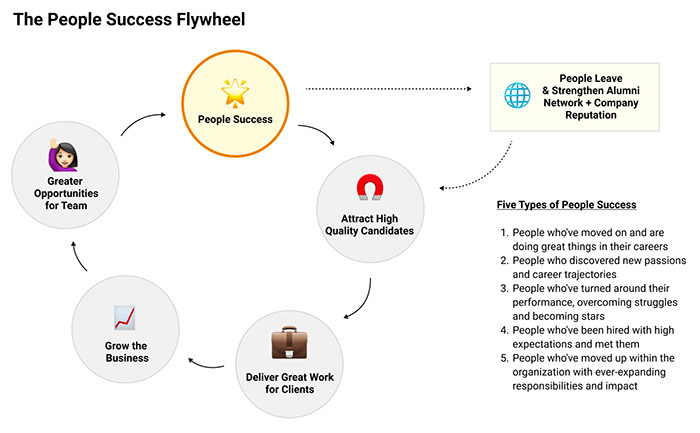I’m pretty certain that when I’m an old man looking back on my time as an agency business owner, the thing that’ll matter most won’t be how much money I made or the prestige of the clients we worked for. The actual work we did for clients will also largely be forgotten. What will matter to me the most, by far, will be the relationships I had with the people I worked with as well as the relationship my business had with all those who came through and were a part of the company. Did we do right by them? Were we a positive impact in their lives? Did I do all I could to be a kind, fair, and supportive employer, manager, and colleague?
I’ve come up with five types of “people success” that never fail to warm my heart and help me see the value in the work I do.
The Five Types of People Success
1. People who’ve moved on and are doing great things in their careers
Barrel may be the biggest and most important part of my own career, but for many who’ve come through, it’s one of many stops in their professional development. For these folks, I only hope that we’ve provided them with meaningful challenges and relationships that ultimately contributed positively to advancing their career goals.
I’ve been fortunate to have kept in touch with several Barrel alums and many have gone on to do impressive things, working at renowned firms, taking on leadership opportunities, starting their own businesses, or successfully switching careers to do something totally different. Whatever the outcomes, there’s some measure of satisfaction knowing that our company was a stop in their journey.
2. People who discovered new passions and career trajectories
This particular type of of people success I like to narrow to those who found what they wanted to do while working at Barrel. It’s similar to the people success of #1, but in these cases, Barrel played a more specific and pivotal role in impacting their career trajectories.
An example that has happened a few different times is when someone was hired for a particular role but then asked to try something else (e.g. hired as QA analyst but asked to try their hand as a growth marketer), usually because we saw greater potential for them to change up their roles. They may have been hesitant at first, but those who took on the challenge have usually gone on to redefine their focus and career goals. Some reverted back to their original role with renewed vigor (totally okay) while others found a new calling that took them to previously unimagined career opportunities.
Appreciating this type of people success reminds us that nobody should be seen as being in a fixed position and that, where possible, we ought to always be imagining people’s potential and opportunities to help them stretch, even if that may mean taking on entirely different roles at the company.
3. People who’ve turned around their performance, overcoming struggles and becoming stars
The turnaround story is often the most satisfying and memorable but also one that we’d like to keep to a minimum. I believe that if hiring, onboarding, and training are set up well along with a robust culture of candid conversations and very clear alignment of expectations for the role, employees should have an easier time excelling.
However, there are cases where, due to some gaps in our processes as well as some behavioral or technical gaps on the part of the employee, performance becomes a real issue and managers need to put in a great deal of work to try to correct things, both in the way they’ve laid out expectations and in providing specific feedback to help the employee change their ways.
In the best of circumstances, the manager’s intervention – the feedback and re-alignment of expectations – ends up working out beautifully. The employee not only improves performance but begins to outperform expectations and becomes a model for others, pushing for certain standards and contributing to the tone of the culture.
I’ve thought a lot about these people successes, the turnaround stories, and as much as I’d like for our leadership team to take credit, I think much of the credit belongs to the employee who chose to accept the reality that their performance wasn’t meeting expectations. These people then went on to embrace the feedback and to put in the time and energy necessarily to change the perception of their performance. They had everything already necessary to become stars.
I celebrate this kind of people success not because it shows how great we are as managers or how we don’t give up on people, but because the people who came to Barrel cared enough to stick through the tough times and do what it took to become valuable contributors to the team.
4. People who’ve been hired with high expectations and met them
This is an underrated type of people success but one that I believe, if commonplace, speaks well of the hiring process, caliber of talent, and the culture. It’s also a type of people success that has been more recent for us as we’ve come to have more awareness and systems in place to understand the concept of setting people up not to fail.
The people successes that come to mind here are for roles where we felt we were making a significant investment especially because they were for new roles and/or non-billable ones. Along with the monetary concerns, we set high expectations, the most important being that this new hire would significantly reduce the responsibility burden on the partners, freeing them up to focus or tackle other challenges and initiatives.
When it’s all clicked, this type of people success has resulted in a feeling of true partnership and total trust. It’s a joy to work with such people and there’s a sense of momentum that comes with a new hire who takes on important responsibilities, infuses new ideas and energy, and frees up leadership to do more.
5. People who’ve moved up within the organization with ever-expanding responsibilities and impact
As a sports fan, this type of people success makes me feel extra tingly with warmth and happiness. I’ve always appreciated teams in pro sports that leverage their strong culture and development system to take young players as well as players who’ve underperformed at other teams and turn them into stars, bringing them along steadily and giving them more and more opportunities to contribute. Likewise, with Barrel, it’s been one of the most rewarding experiences to bring on team members who, over time, keep on getting better and are game to take on more responsibilities.
Whether it’s over a 2, 5, 8, or 10+ year span, seeing someone grow and move up within the organization is always cause for celebration. It’s a testament to their commitment–to their work, their teammates, and their personal growth–and to witness this up-close is truly memorable. To have had a part in the process is perhaps the most thrilling part of managing people.
In Service of Others
A company that regularly generates people successes creates for itself a flywheel in which the success attracts higher quality candidates, which in turn leads to better work and stronger business growth, which then allows for more people success. Those who leave the company serve to strengthen the brand with a robust network of highly capable professionals whose subsequent successes burnish the company’s reputation, drawing in more quality people to the fold and fueling the flywheel.

I hope I don’t come off cynical when I write this: focusing on the success of others and doing what you can in service of helping them reach their potential is one of the best things you can do to advance yourself. The win-win dynamic is powerful. It’s also what I know will furnish the most rewarding memories for me long after I’ve stopped working on the business.
